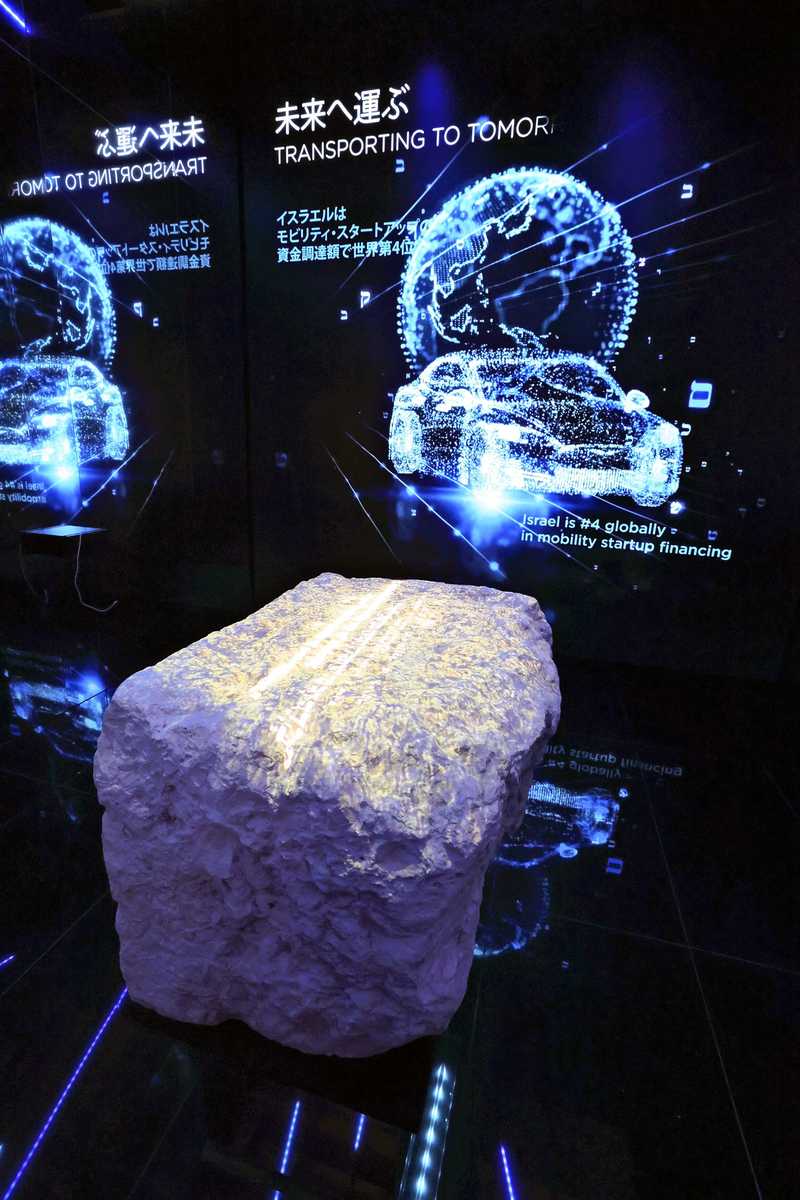2025 Expo Osaka: Israel Plans to Display Ancient Stone from Jerusalem; Palestinian Side Opposes Idea, to File Objection with Japan Govt

A stone to be displayed at the Israeli pavilion at the 2025 Osaka-Kansai Expo is seen in Konohana Ward, Osaka, on Wednesday.
1:00 JST, April 13, 2025
Israel plans to display an ancient building stone from the Old City of Jerusalem at the 2025 Osaka-Kansai Expo, which will open on Sunday in Osaka City. Officials from the Palestinian side have objected to the idea.
The stone is from East Jerusalem, which has been occupied by Israel since the 1967 Arab-Israeli war, and will be shown as the centerpiece of its pavilion.
According to the Israel pavilion, the stone, weighing about 1.5 tons, was discovered in 1969. It is believed to have been a part of a tower built by the Jewish Hasmonean dynasty to protect Jerusalem after their war against Syrian rule about 2,000 years ago. The pavilion said the stone will be exhibited as a symbol of ‘resilience and renewal’ of Israel.
Jerusalem has sacred sites for Judaism and Islam, and both Israel and the Palestinian Authority claim the holy city. The Palestinians aim to establish an independent state with East Jerusalem as its capital.
Waleed Siam, the ambassador and representative of the Permanent General Mission of Palestine in Japan, told The Yomiuri Shimbun on Friday that the move by Israel violates an international convention that prohibits the export of cultural property from occupied territories, and it is doubtful whether the stone is 2,000 years old.
Siam said he intends to file an objection with the Japanese government and the Japan Association for the 2025 World Exposition.
Meanwhile, Israeli government representative Yahel Vilan said it is a historical fact that there were no Muslims in Jerusalem when the stone was quarried about 2,000 years ago, adding there is no political agenda behind the exhibition.
“The exhibition is probably intended to show off Jewish history that dates back before Christ,” said Hiroyuki Suzuki, a specially appointed professor at the University of Tokyo’s Center for Middle Eastern Studies. “It may cause controversy as a move to appeal that the area concerned is part of their country.”
Related Tags
Top Articles in Society
-

Producer Behind Pop Group XG Arrested for Cocaine Possession
-

Man Infected with Measles Reportedly Dined at Restaurant in Tokyo Station
-

Man Infected with Measles May Have Come in Contact with Many People in Tokyo, Went to Store, Restaurant Around When Symptoms Emerged
-

Woman with Measles Visited Hospital in Tokyo Multiple Times Before Being Diagnosed with Disease
-

Australian Woman Dies After Mishap on Ski Lift in Nagano Prefecture
JN ACCESS RANKING
-

Producer Behind Pop Group XG Arrested for Cocaine Possession
-

Japan PM Takaichi’s Cabinet Resigns en Masse
-

Man Infected with Measles Reportedly Dined at Restaurant in Tokyo Station
-

Israeli Ambassador to Japan Speaks about Japan’s Role in the Reconstruction of Gaza
-

Videos Plagiarized, Reposted with False Subtitles Claiming ‘Ryukyu Belongs to China’; Anti-China False Information Also Posted in Japan























